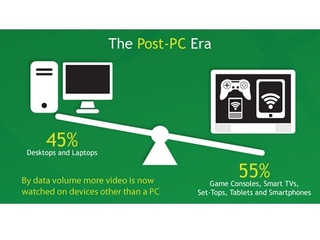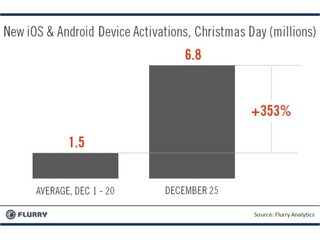
Holiday week sets record 1.2B mobile apps downloaded
The U.S. led the charge breaking the one billion apps downloaded mark for first time ever

If the last week in 2011 is any guide, 2012 will be a record year for app downloads.
The last seven days of last year saw more device activations and app downloads than any week ever, according to a report released Monday by Flurry Analytics.
Over 20 million Android and iOS devices were activated, and 1.2 billion apps were downloaded between December 25 and 31. The holiday season 2011 is, thus, the first time ever for the apps downloaded figure has broken the one billion mark.
Flurry's data is statistically figured from its access to the 20% of all apps downloaded from the App Store and Android Market, and the 90% of device activations it can detect, as well as triangulated with data released by Google and Apple.
The number of apps downloaded in the week from Dec. 25 to Dec. 31 was 60% higher than an average of the number of apps downloaded in the two weeks previous. The week just before the record-breaking last week of 2011, as in the week that ended on Dec. 24, also set a record with 857 million apps.
The United States overwhelmingly was the greatest contributor to the record-breaking stat, representing 42.3% of global app downloads, with 509 million apps downloaded. China was a distant second, with 99 million apps downloaded, and the U.K. brought up third with 81 million.
Flurry indicated that while the large number was unprecedented, it was by no means a surprise, given recent data. Flurry's report says that billion-download weeks will become more and more common as mobile becomes the platform of choice for Web connectivity. This prediction falls in line with their previous data for Christmas Day, showing intense spike of mobile activity.
In general, market trends and statistical findings, like those reported by Flurry, suggest that people are inreasingly leaning away from PC-based Web platforms toward tablets and smart phones. Major manufacturers, distributors, and end users themselves are all recognize that, while desktop applications will always be around for certain tasks, the average user will increasingly access the Web through some kind of mobile device in the future.
Related News


Android continues to dominate mobile ad impressions

Android to top iPhone in 2012?

